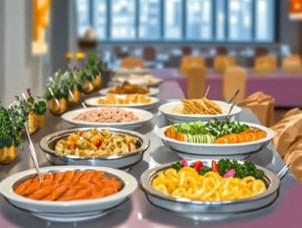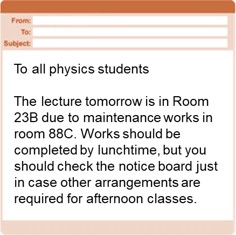Mock question sets are simulated test questions. Use this mock question set to prepare for your Linguaskill General Reading & Listening test.
Question 1:
Click to listen. Then, answer the question.
Two friends are discussing whether to book a particular hotel room. What is their main reason for booking it?



Question 2:
Click to listen. Then, answer the question.
A radio deejay is giving the weather forecast. What is the weather going to be over the next few days?



Question 3:
Click to listen. Then, answer the question.
What do the man and woman agree about the blog article?
They recommend presents that are expensive.
They help give ideas for presents.
They provide advertising for stores.
Question 4:
Click to listen. Then, answer the question.
When introducing her guests, Jane gives off the impression that she is...
reluctant to recommend her own preference of books.
impressed by Jasmine's and Brandon's book sales.
excited to discover books that deserve greater recognition.
aware that holidays affect the books that people buy.
When talking about her first recommendation, Jasmine...
reminisces about a favourite former pastime in the book.
tells readers not to be put off by its core theme.
suggests that the book will appeal to tech entrepreneurs.
admits she would not have chosen the book for relaxation purposes.
Brandon implies his first book of the summer represents a need to...
avoid lengthy stories with heavy subject matter.
contrast its style with a book that is related in theme.
select an author whose work had already impressed him in the past.
explore the mindset of people living in rural countries.
Jasmine and Brandon agree that the two Emily Blunt books...
are equally appealing as their narrative styles are similar.
were subject to unfair comments by critics.
are more suitable for a specific type of reader.
can be appreciated whether read successively or independently.
What did Jasmine like particularly about Tom Brady's book 'The Cold Coffee'?
its insight into a unique relationship.
its surprising and refreshing twist at the end.
its effective use of prose and story.
how relatable the characters and settings are to her own experience.
Question 1:
Choose the correct answer.

Students who have morning lectures will need to go to a different venue tomorrow.
Students in the afternoon need to read the notice board until repairs are completed.
Students will hear which room their lecture will be in by lunchtime tomorrow.
Question 2:
Choose the correct answer for the gap.
In all occupations there are of creativity, albeit there are more in some compared to others.
Question 3:
Choose the correct answers.
A Book Review
Mason Plumlee is far from the first to observe that in the digital age, "the more information we consume, the less informed we seem to be." Yet, in this engaging and thought-provoking book, he convincingly argues that this phenomenon is especially evident in the realm of food and diet, an area that used to be relatively straightforward. When it comes to eating habits, many of us, as one psychology professor Plumlee cites, have become strikingly "insensitive to evidence." How else can we explain the surge of people without coeliac disease making the scientifically baseless choice to avoid gluten? Or the widespread influence of health websites peddling dubious claims like "wild blueberries remove heavy metals from brain tissue"? Plumlee highlights the absurdity of the detox industry, which thrives by rejecting three basic facts: the modern world does not expose us to unprecedented levels of toxins; a healthy body naturally eliminates toxins in its usual unglamorous ways; and no single food, not even blueberries, can perform this function for us.
At this point, though, Plumlee is merely warming up. In subsequent chapters, he systematically dismantles a host of food myths with scientific precision and a touch of mischievous delight. Take, for example, proponents of the Paleo Diet, who claim humans aren’t biologically adapted to eat anything beyond what hunter-gatherers once consumed—despite the fact that nobody knows exactly what that was. Or the baseless fear of sugar, which Plumlee assures us won’t harm us in moderation.
Early on, Plumlee's tone is more measured than furious—though it’s easy to see why "The Relatively Measured Chef" might not have been the most marketable title. He even remains composed while debunking the simplistic "natural versus chemical" dichotomy promoted by self-styled wellness gurus, who seem to forget that all of nature is made up of chemicals.
As the book progresses, however, Plumlee delves deeper into what he describes as the "dark heart" of dietary fads. On the surface, faking enthusiasm for kale smoothies and quinoa might appear to be harmless, if self-indulgent, nonsense. But Plumlee warns these trends can act as a "gateway", leading individuals into more dangerous forms of credulity.
In the first paragraph, what effect of digitalisation is discussed?
people are easily led into silly weight reduction programmes.
people are sometimes suspicious of information that is useful.
people are attracted to foods that are unhealthy.
people think and behave irrationally when it comes to eating.
In the second paragraph, what is the reviewer doing?
disagreeing with an opinion that has been given.
anticipating a critical response to a specific viewpoint.
defending Plumlee on an arguable issue.
praising Plumlee for his unique insights.
The fourth paragraph explains that people who are interested in healthy eating fashions...
set a concerning precedent for themselves.
deserve to be punished from being deceived.
are well within their rights for doing so.
cause problems for other people around them.
In the last paragraph, the reviewer criticises health gurus because...
health gurus are cynical people.
health gurus are attention-seeking people.
health gurus are stubbornly persistent people.
health gurus are self-centered people.
Throughout this article, the reviewer...
references experts about the claims being made.
describes Plumlee as a person whose views have changed over time.
uses irony and humour to agree with Plumlee's position.
takes care not to sound critical of people whose views he disagrees with.
Question 4:
Write the correct answer in each gap.
The San Francisco Gold Rush
The identity of the first person to discover gold in San Francisco remains a topic of debate, and it be fair to say that we will likely never know for certain. However, the discovery of gold in 1848 set off the San Francisco Gold Rush, one of the largest in history. Thousands of people flocked to the gold fields, both within San Francisco and from overseas.
Life for the prospectors was incredibly challenging. There were proper roads nor shops, housing was rudimentary, and illness was widespread. some miners struck it lucky and amassed great wealth, the majority did not. Those who profited the most were the tradespeople who sold essential supplies and tools or the landowners who sold property to prospectors who, after the rush, chose to settle down and make San Francisco their home.
Question 5:
Choose the correct answer for each gap.
Board Game Culture in Singapore
Across cities in Singapore, you might notice the growing number of cafés entirely to board games. Many of these establishments have up within the past few years. Singapore, where board game cafés seem to be on almost every corner, has become a leading example for other cities aiming to their own board game scene.
These cafés offer more than just games; they also serve an array of unique teas and coffees. Step inside, and you'll encounter a environment filled with animated conversation, laughter, and the clatter of dice. One thing you’re unlikely to see is anyone their phone screens.